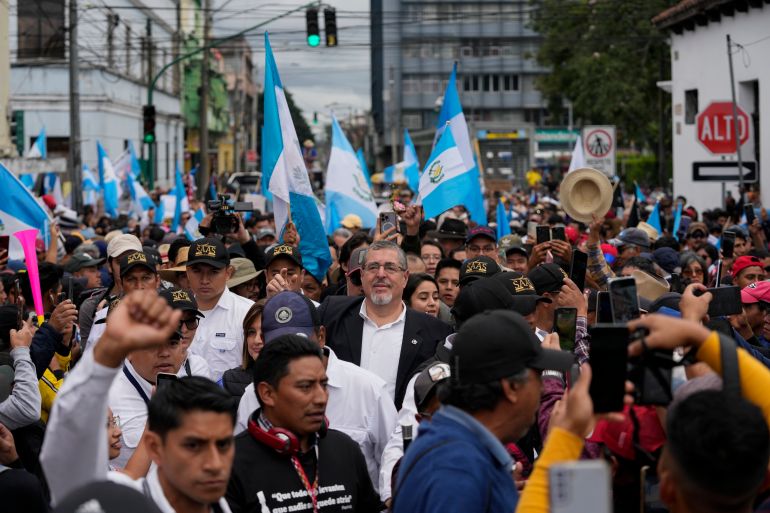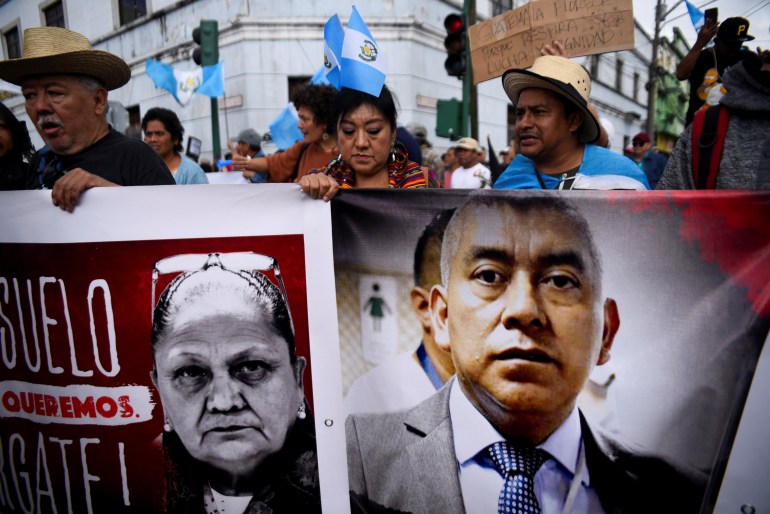Guatemala prosecutors threaten to annul victory of President-elect Arevalo
Guatemalan tribunal defends election results as ‘unalterable’, while critics blast prosecutors for attempting a ‘coup’.

Guatemala’s Supreme Electoral Tribunal has declared the results of this year’s presidential race “unalterable” after public prosecutors openly questioned whether to annul the vote.
The prosecutors’ statements sparked a domestic and international firestorm, marking what critics consider the latest — and most directly stated — effort to overturn President-elect Bernardo Arevalo’s election victory.
Keep reading
list of 3 itemsWhat next for Guatemala after latest political turmoil? Experts weigh in
Brazil’s Lula warns Guatemala risks a ‘coup’, prompting rebuke at UN
The Organisation of American States (OAS), a regional election watchdog, went so far as to condemn the statements as “an attempted coup d’etat“.
“The actions and statements of prosecutors Rafael Curruchiche and Leonor Morales constitute an alteration of the country’s constitutional order, a breach of the rule of law and a violation of the human rights of the population of their country,” it said in a statement on Friday.
“The attempt to annul this year’s general elections constitutes the worst form of democratic breakdown and the consolidation of a political fraud against the will of the people.”
The latest chapter in Guatemala’s ongoing election turmoil erupted on Friday with a press conference led by Curruchiche, Morales and Angel Pineda Avila, the secretary-general of the Public Ministry.
Prosecutors with the Public Ministry have been accused of undemocratic actions in the past. The United States, for instance, has previously alleged that Curruchiche and Pineda “obstructed investigations into acts of corruption” to further their political aims.
In Friday’s briefing, the prosecutors reiterated their request that Arevalo be stripped of his political immunity, a step that could open him up to prosecution. They accused him of improperly gathering signatures for his presidential campaign, as well as mishandling political funds.
But they went a step further, raising the prospect of the presidential election being overturned as the result of their findings.
“Today is a historic day for democratic institutions,” Pineda said in the press conference, defending his colleagues’ work as “impartial” and denying any intent to interfere in the election results.
But the backlash to the press conference was swift. Blanca Alfaro, the head of the Supreme Election Tribunal, a government body charged with maintaining election integrity, quickly responded with a news conference of her own, refuting the possibility that a new election could be held.
“I would like to ratify, in my role as magistrate and in a personal capacity, that the results are valid, official and unalterable,” she said.
She also affirmed that Arevalo and his vice president, Karin Herrera, would take office as planned. “At this moment, there is no way that the Supreme Electoral Tribunal is going to repeat the elections.”
Prosecutors have previously targeted the Supreme Election Tribunal itself, ordering raids on its offices after the elections that resulted in sealed ballot boxes being opened.

Guatemala has long struggled to rein in official corruption. For instance, a United Nations-backed body called the International Commission against Impunity in Guatemala (CICIG) found itself abruptly shuttered in 2021, after then-President Jimmy Morales accused it of illegal acts.
Morales himself has since come under investigation for corrupt activities.
This year’s presidential race has likewise been marred by questions of election integrity. Three prominent candidates were disqualified before the first round of voting, including the then-frontrunner.
Arevalo, meanwhile, was a dark horse, running on a progressive anticorruption platform with the Seed Movement party. But he soared into the spotlight with a surprise second-place finish in the June general elections, securing one of two spots in the run-off race.
That’s when the trouble for him and his party started. Within days, a Guatemala court agreed to suspend the results of the vote, pending a review. After the results were upheld, the Seed Movement itself faced suspension, after prosecutors alleged it had improperly gathered signatures to register as a political party.
The efforts to suspend the Seed Movement persisted even after Arevalo notched a landslide victory in the run-off. He secured over 60 percent of the vote, trouncing former Vice President Sandra Torres, a conservative candidate.
But prosecutors have continued to investigate Arevalo, prompting election observers to question whether they plan to scuttle his victory through antidemocratic means.
In November, for instance, the Public Ministry filed a request to strip Arevalo of his political immunity over his participation in a student-led protest movement, citing his social media posts at the time.
Protests, however, have broken out across the country to uphold the election results, many of which have been led by Indigenous leaders.
Arevalo is scheduled to be sworn into office on January 14, succeeding outgoing conservative President Alejandro Giammattei.